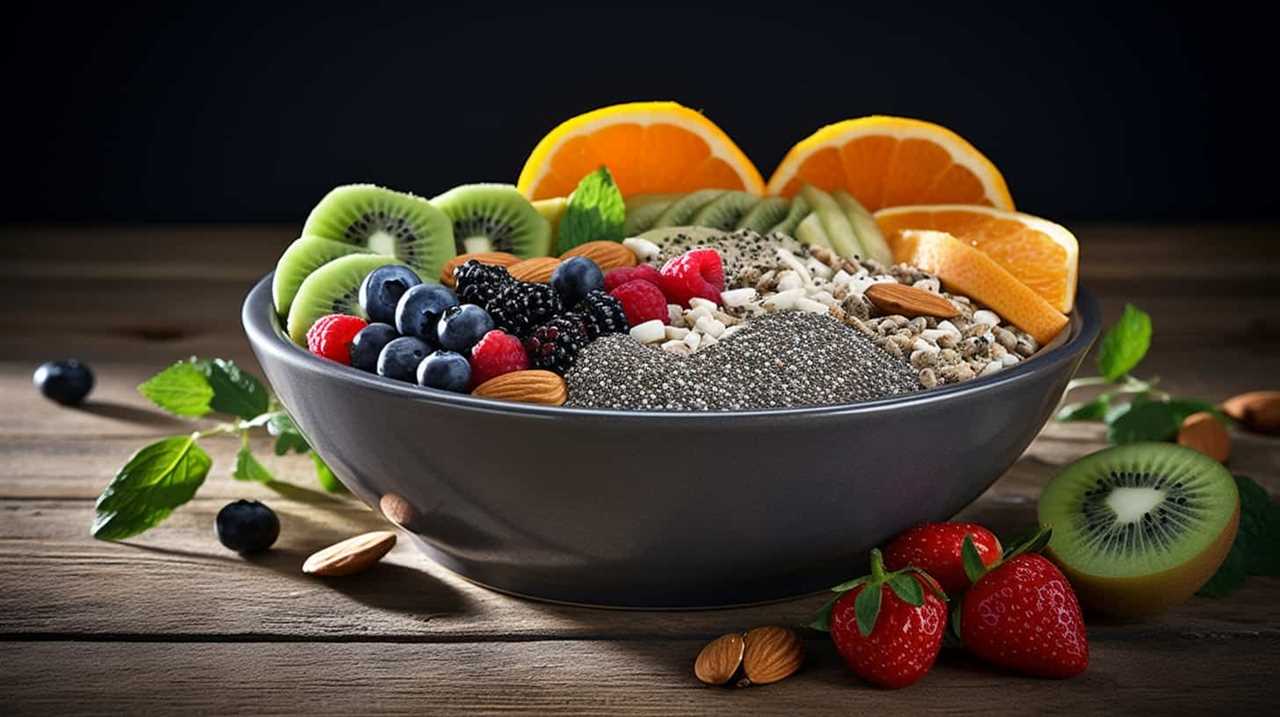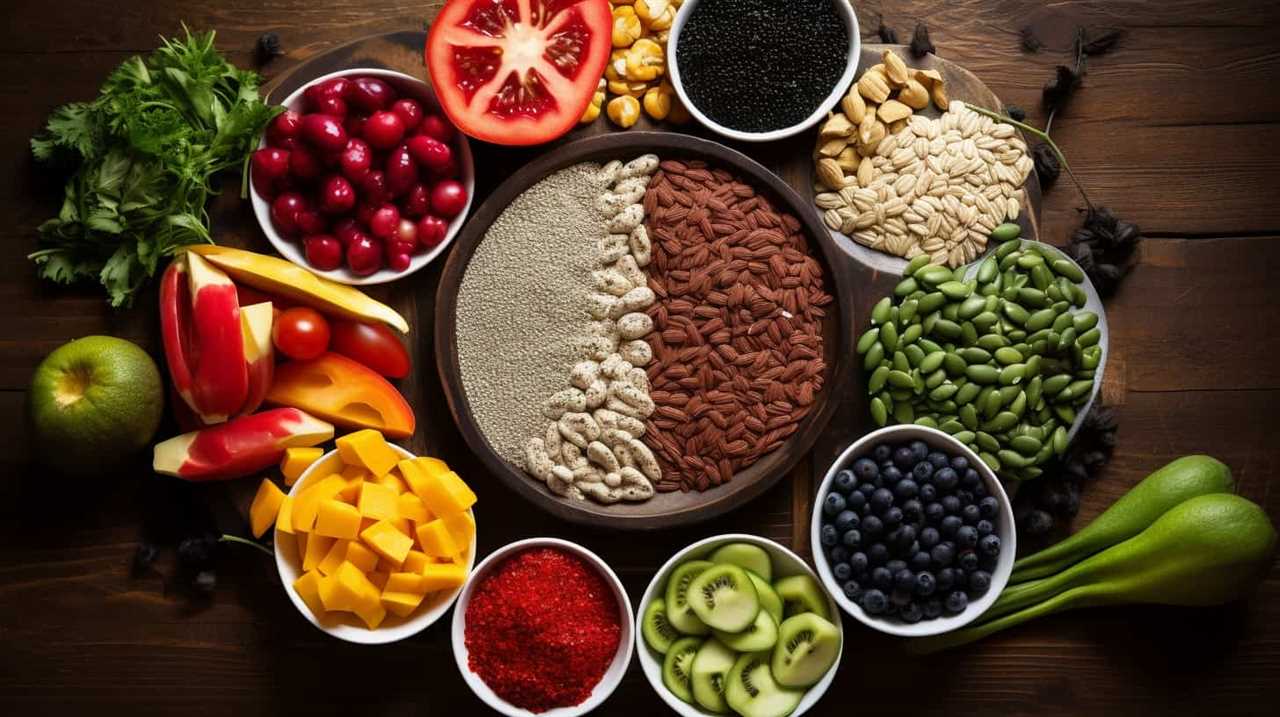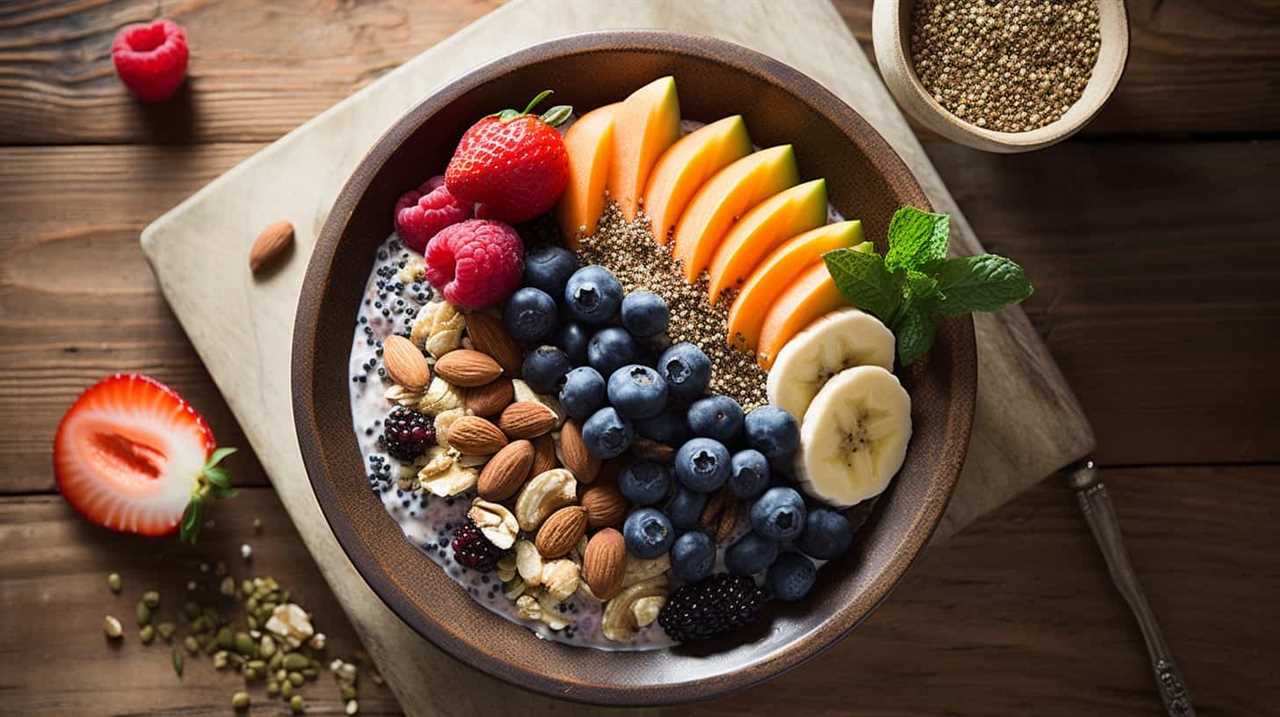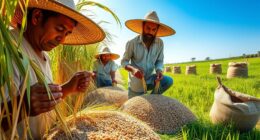Have you ever wondered about the beginnings of those tiny yet powerful omega-rich seeds?
Well, buckle up and join us on a journey through time as we trace the agricultural origins of these tiny yet mighty seeds.
From their humble beginnings in ancient civilizations to their revival in modern agriculture, we will explore the fascinating story of how these seeds have nourished and served humanity throughout the ages.
So, let’s dive in and uncover the secrets of our omega-rich allies!

Key Takeaways
- Chia seeds have a rich history dating back thousands of years and were a staple in the diets of ancient civilizations like the Aztecs and Mayans.
- Chia seeds are packed with essential nutrients such as omega-3 fatty acids, fiber, protein, and minerals, providing numerous health benefits.
- Ancient farmers experimented with cultivation techniques, leading to the genetic diversity and domestication of chia seeds.
- Chia seeds offer a sustainable and versatile option for modern agriculture, being adaptable to different climates, supporting soil fertility, and promoting crop rotation.
Ancient Origins of Chia Seeds
In our exploration of the agricultural journey of omega-rich seeds, we begin by delving into the ancient origins of chia seeds. Chia seeds, scientifically known as Salvia hispanica, have a rich history that dates back thousands of years. These seeds were a staple in the diets of the ancient Aztecs and Mayans, who valued their incredible nutritional value.
Chia seeds are packed with essential nutrients, including omega-3 fatty acids, fiber, protein, and minerals like calcium and magnesium. These evolutionary adaptations allowed chia plants to thrive in harsh conditions, making them a reliable source of sustenance for ancient civilizations.
Today, chia seeds continue to be celebrated for their health benefits and are a popular addition to smoothies, baked goods, and breakfast bowls.
Early Cultivation and Domestication
Our exploration of the agricultural journey of omega-rich seeds now turns to the early cultivation and domestication of these valuable crops.

Early cultivation techniques played a crucial role in the development of agricultural practices that allowed humans to harness the nutritional benefits of these seeds. Ancient farmers experimented with various methods such as selective breeding, irrigation, and soil management to improve crop yields and adapt them to different environments.
These techniques not only helped in the domestication of omega-rich seeds but also contributed to the genetic diversity in domesticated crops. By selecting and propagating seeds from the best-performing plants, early farmers unintentionally increased the genetic variation within these crops, leading to more resilient and productive varieties.
The early cultivation and domestication of omega-rich seeds laid the foundation for their widespread cultivation and utilization in today’s society.
Chia Seeds in Mesoamerican Civilizations
Continuing our exploration of the agricultural journey of omega-rich seeds, we now delve into the significance of chia seeds in Mesoamerican civilizations. Chia seeds, known as ‘the running food,’ were highly valued by the ancient people of Mesoamerica for their culinary uses and nutritional benefits. These small seeds were a staple in their diets, providing sustenance and energy for their active lifestyles.

Here are some key points about chia seeds in Mesoamerican civilizations:
- Chia seeds were commonly used to make a refreshing beverage called ‘chia fresca,’ which combined the seeds with water, citrus juice, and sweeteners.
- They were also used as a versatile ingredient in various dishes, such as soups, stews, and tortillas, adding a nutty flavor and a boost of essential nutrients.
- Chia seeds were rich in omega-3 fatty acids, fiber, protein, and antioxidants, making them a valuable source of nutrition for the Mesoamerican people.
With their remarkable culinary uses and nutritional benefits, chia seeds played a vital role in the diets of Mesoamerican civilizations.
Transitioning to the subsequent section, we’ll now explore the significance of chia seeds in traditional medicine.
Chia Seeds in Traditional Medicine
Let’s explore the role of chia seeds in traditional medicine, starting with their various medicinal properties.

Chia seeds have been used in traditional medicine for centuries due to their numerous health benefits. These tiny seeds are packed with nutrients such as omega-3 fatty acids, fiber, antioxidants, and essential minerals like calcium and magnesium.
Traditional uses of chia seeds include promoting digestion, reducing inflammation, improving heart health, and boosting energy levels. The high fiber content of chia seeds aids in regulating bowel movements and preventing constipation.
The omega-3 fatty acids present in chia seeds have been linked to reducing the risk of chronic diseases such as heart disease and diabetes. Furthermore, chia seeds are believed to have antioxidant properties that may help protect against oxidative stress and inflammation in the body.
Incorporating chia seeds into your diet can provide a natural and holistic approach to enhancing overall health and well-being.

Revival of Chia Seeds in Modern Agriculture
Chia seeds have experienced a resurgence in modern agriculture, with farmers increasingly incorporating them into their crop rotation. This revival of chia seeds can be attributed to the recognition of their nutritional benefits and the implementation of various revival techniques.
Farmers have started to realize the immense nutritional value of chia seeds, which are packed with omega-3 fatty acids, fiber, protein, and antioxidants. These tiny seeds provide essential nutrients that promote heart health, improve digestion, and support overall well-being.
The use of innovative farming techniques has also contributed to the revival of chia seeds. Farmers are now employing sustainable farming practices, such as organic farming and regenerative agriculture, to cultivate chia seeds. These methods not only enhance soil health but also minimize the use of chemical fertilizers and pesticides.
Additionally, the versatility of chia seeds has played a significant role in their revival. They can be easily incorporated into various dishes, including smoothies, salads, and baked goods, making them a popular choice for health-conscious individuals.

With their nutritional benefits and adaptability, chia seeds are once again taking their place in modern agriculture, providing a sustainable and nutritious option for farmers and consumers alike.
Frequently Asked Questions
What Are Some Common Uses of Chia Seeds in Modern Cooking and Baking?
Chia seeds have become a staple in modern cooking and baking. We use them in traditional dishes like chia puddings and energy bars. They also have innovative uses in food and beverages, like chia-infused drinks and chia seed crackers.
Are There Any Potential Side Effects or Allergies Associated With Consuming Chia Seeds?
Potential side effects or allergic reactions may occur when consuming chia seeds. It is important to be aware of these risks and consult with a healthcare professional if any concerns arise.
How Do Chia Seeds Compare to Other Plant-Based Sources of Omega-3 Fatty Acids?
Chia seeds have a higher omega-3 fatty acid content compared to flax seeds. They also contain essential nutrients like fiber, protein, and antioxidants. Their nutritional profile makes them a valuable addition to a plant-based diet.

Can Chia Seeds Be Grown and Cultivated in Different Climates and Regions Around the World?
Yes, chia seeds can be grown and cultivated in different climates and regions around the world. However, there are challenges in adapting to various conditions. Despite this, the benefits of chia seeds in sustainable agriculture make it worth exploring their cultivation in diverse environments.
Are There Any Specific Nutritional or Health Benefits Associated With Consuming Chia Seeds?
There are numerous nutritional and health benefits associated with consuming chia seeds. They are rich in omega-3 fatty acids, fiber, and antioxidants, which can support heart health, aid digestion, and promote overall well-being.
Conclusion
As we trace the agricultural journey of omega-rich seeds, we uncover a fascinating tale of ancient origins, early cultivation, and their significance in Mesoamerican civilizations.
These tiny seeds, once revered in traditional medicine, have now found a revival in modern agriculture. Symbolic of resilience and adaptability, their story mirrors our own human quest for knowledge and nourishment.

Let’s embrace the power of these seeds as we embark on our own journey of growth and transformation.









